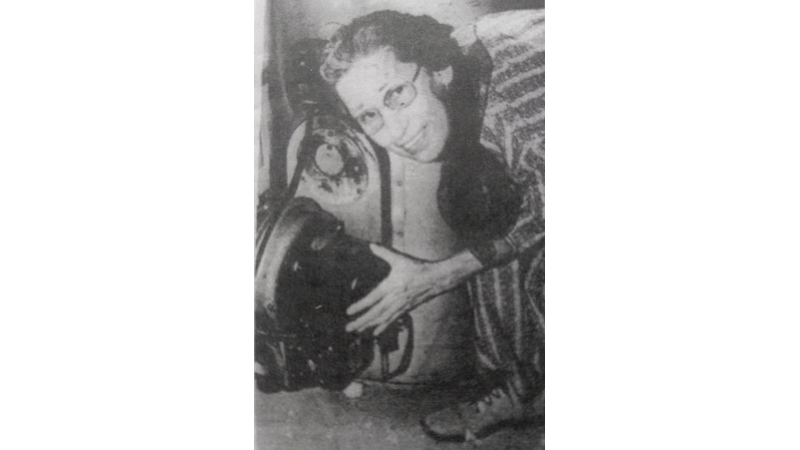LOOKING BACK: Dwindling supply of fuel oil
Published 5:24 pm Wednesday, March 8, 2023

- This is a 1973 photo of Lina Harcum inspecting her oil furnace. (Photo submitted by Clyde Parker)
|
Getting your Trinity Audio player ready...
|
Fifty years ago, in February of 1973, during a severe cold spell, the Isle of Wight, Franklin, Southampton area was beginning to feel the effects of the nation’s dwindling supply of fuel oil. And, another cold spell was expected. Fuel oil distributors in the area were reporting that they were unable to take on any new customers; but, thus far, they were not having problems in serving their regular customers.
Area dealers were operating on fuel oil allotments for the remainder of the year in an effort to conserve as much fuel as possible; but, at that time, according to many in the business, the outlook was grim.
Mrs. Annie Glen Jones, office manager at Darden Oil Co. in Franklin confirmed the report that her company was unable to handle any new fuel oil customers. “We’ve been able to serve our regular customers without any problems. But if we have a real cold spell, things might get tough,” Mrs. Jones pointed out. “The only thing we can tell our customers is to remind them to be sensible in their use of fuel oil.”
Sol W. Rawls, Jr. – of S. W. Rawls, Inc. – was optimistic. “I don’t believe we’re gong to have any problems here,” he said. “Things are tight right now, but I think everything will be all right. I just hope we have a few more warmer days.”
Boykins distributor Elmo L. Rock reported he had plenty of fuel oil. “We haven’t had any trouble yet,” he said. “We’re not taking on any new customers, and we are on allotment.” Rock was serving around 1,200 customers in Southampton County and Northampton and Herford counties in North Carolina.
Forrest C. Teakley, manager, Southern States Oil Distributors in Windsor reported much the same situation in his area. “So far, we haven’t witnessed any difficulty,” he explained. “But we’re being very selective in accepting new customers. I think we have enough oil to see us through this thing.” Southern States was serving between 1,000 and 1,400 customers in Isle of Wight, Suffolk, Nansemond, and Sussex.
The installation of a new fuel oil storage tank at the beginning of the year turned out to be a blessing for Smithfield Farmers, Inc.., another heating oil distributor. “We put in extra storage tanks without even knowing this crisis situation was going to develop,” pointed out manager Linwood Garrison. “So far, we’ve been very very fortunate but I don’t know for how long. All our tanks are pretty well full. We’re keeping our heads above water. The situation could become dangerous if the weather gets worse this winter,” continue Garrison. “We’re pleading with our customers to use every possible precaution to conserve oil.”
Officials with the State Emergency Planning Agency and the Department of Agriculture and Commerce recently urged fuel oil consumers to do their part to help prevent shortages from arising by taking measures such as lowering the heat at night and when away. Further suggestions included: closing off rooms not in use; closing dampers when fireplaces are not in use; keeping furnace filters clean for more efficient furnace operation; and closing window draperies, particularly at night. The State agencies also suggested installation of storm windows and additional insulation where possible.
The preceding describes how the evolving global oil/energy crisis, in 1973, was beginning to affect the immediate region, the United States in general, and the world. A Virginia Department of Transportation official predicted that within a few years, motorists would be paying $1.00 per gallon for gasoline. At that time, the average price of gasoline was 39 cents per gallon. Also, city dwellers on the east coast of the United States were experiencing electrical shortages.
In October of 1973, members of the “Organization of ARAB Petroleum Exporting Countries,” led by King Faisal of Saudi Arabia, proclaimed an oil embargo. The embargo was targeted at nations that had supported Israel during the Yom Kippur War: United States, United Kingdom, Canada, Japan, and The Netherlands – though the embargo also later extended to Portugal, Rhodesia, and South Africa. By the end of the embargo in March of 1974, the price of oil had risen 300% – from $3 a barrel to nearly $12.
CLYDE PARKER is a retired human resources manager for the former Franklin Equipment Co. and a member of the Southampton County Historical Society. His email address is magnolia101@charter.net.





